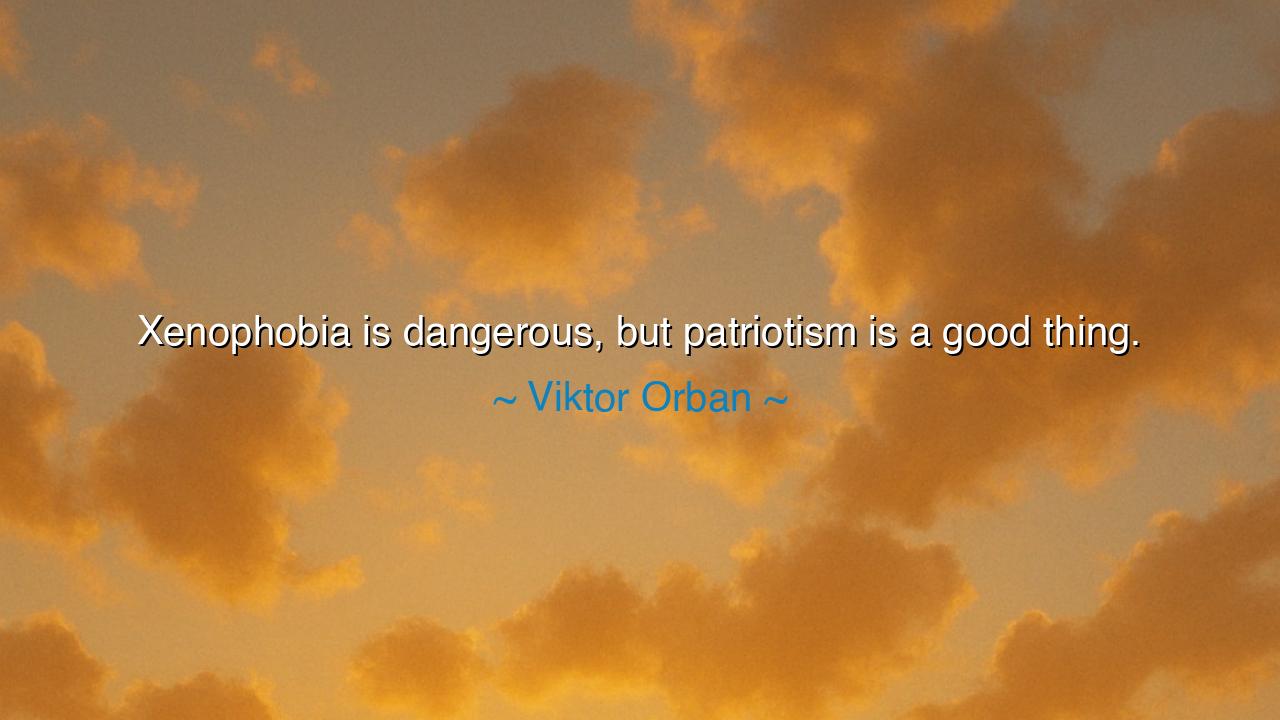
Xenophobia is dangerous, but patriotism is a good thing.






“Xenophobia is dangerous, but patriotism is a good thing.” Thus spoke Viktor Orban, drawing a line between two powers of the human heart—one that corrupts and destroys, and one that builds and uplifts. In these words he seeks to distinguish between fear and love, between hatred of the stranger and devotion to the homeland. To confuse the two is perilous, for while xenophobia breeds division and violence, patriotism can inspire sacrifice, unity, and renewal.
The origin of this quote lies in the long tension that nations have faced: how to preserve their identity without closing their hearts, how to love their people without despising others. Xenophobia, rooted in fear of the foreign, drives men to suspicion, cruelty, and narrowness of vision. It blinds them to the common humanity that exists in every tribe and tongue. Yet patriotism, rightly understood, is love of one’s land, one’s culture, and one’s people—a noble affection that binds generations and calls men to labor for the good of their community. Orban’s words remind us that these two are not the same, though they often masquerade as one another.
History gives us a shining example of this truth. Consider the life of Mahatma Gandhi. He was fiercely patriotic, yearning for India’s independence and dignity, yet he did not fall into xenophobia. He did not despise the British as a race; he opposed their rule. His love for his homeland was not born of hatred for others but of a vision for his own people’s freedom. This is the kind of patriotism that uplifts the world, proving that loyalty to one’s nation need not breed hostility toward the foreigner.
On the other hand, history also shows the darkness of xenophobia. In Nazi Germany, fear and hatred of the “outsider” were fanned into a fire that consumed millions of innocent lives. There was no true patriotism in such horror, for love of Germany was twisted into hatred of humanity. This example teaches us that when love of one’s homeland becomes poisoned by fear and contempt for others, it ceases to be noble and becomes a force of ruin. Thus we must guard the boundary carefully, as one guards the line between medicine and poison.
The lesson for our age is clear: cherish your homeland, but never let that love harden into walls of hatred. To be patriotic is to protect your land, honor your culture, and serve your people, but to be xenophobic is to shrink your heart, to deny the worth of those who are not like you. True strength lies not in rejecting the foreigner, but in being so deeply rooted in one’s own soil that one can meet others without fear. Patriotism builds bridges from strong foundations; xenophobia burns bridges from weak hearts.
Practical actions flow from this wisdom. Celebrate the songs, stories, and traditions of your people. Teach your children the beauty of their land and the sacrifices of their ancestors. But also extend your hand to the stranger, recognizing that love of one’s own does not demand hatred of another. Defend your culture without despising others’ cultures, and let your patriotism be a light, not a sword.
So let us remember always: “Xenophobia is dangerous, but patriotism is a good thing.” To love one’s homeland is noble; to fear and despise the stranger is ignoble. A nation built on patriotism endures with pride and dignity. A nation consumed by xenophobia crumbles beneath its own hatred. Choose love of homeland, not fear of others, and in this way, your people will flourish, and your nation will shine as a beacon in the world.






AAdministratorAdministrator
Welcome, honored guests. Please leave a comment, we will respond soon